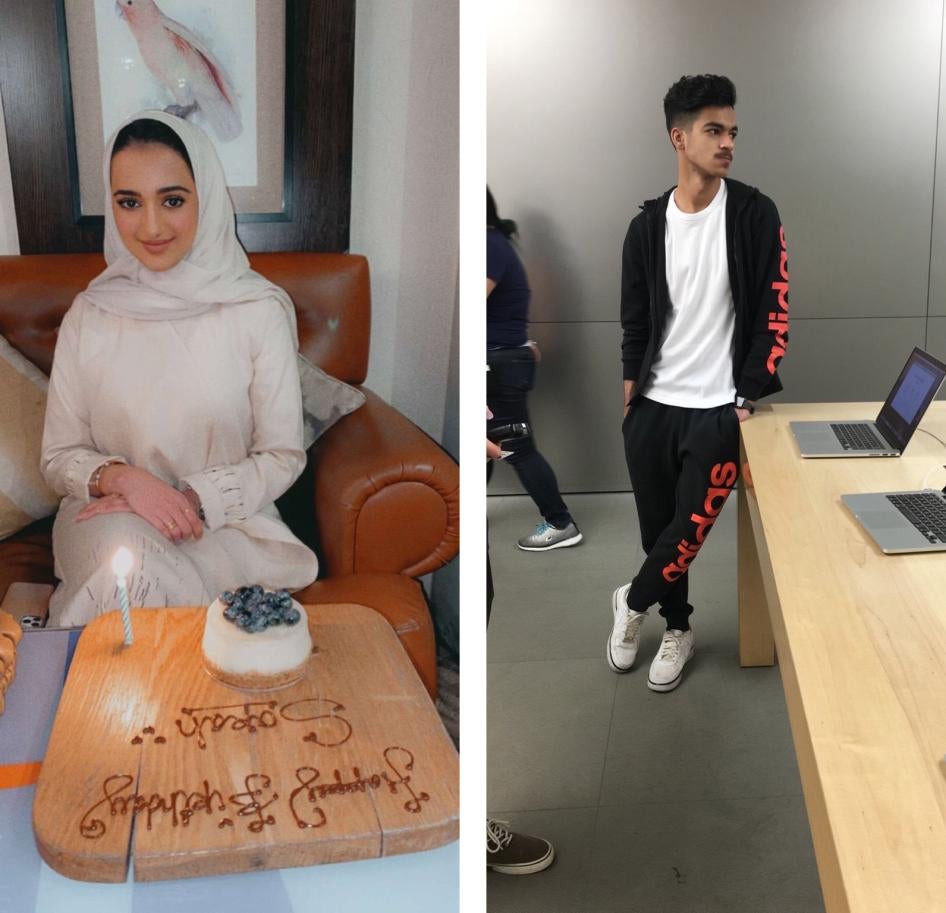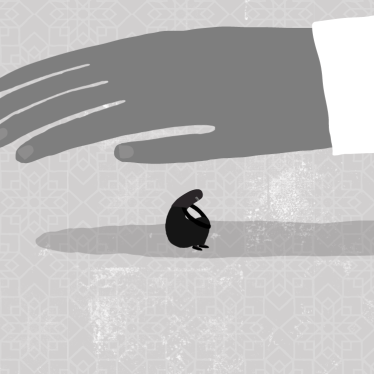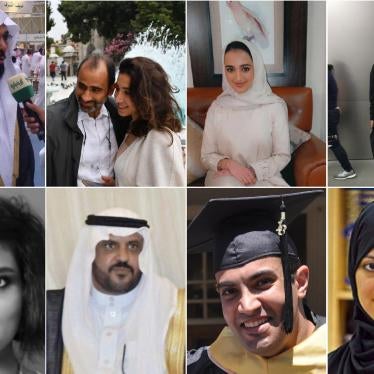(Beirut) – Saudi authorities should immediately release the imprisoned children of a former Saudi official following an unfair trial that took place in an apparent effort to coerce him to return to Saudi Arabia, Human Rights Watch said today. Omar Al-Jabri, 23, and Sarah Al-Jabri, 21, the children of Saad Al-Jabri, a former top Saudi intelligence official, were arrested in March 2020 and held incommunicado until January 2021.
Saudi authorities brought charges against the siblings in September 2020, a month after their father sued Crown Prince Mohammed bin Salman in US Federal Court under the Torture Victim Protection Act, alleging that the crown prince had sent a hit squad to murder him in Canada in 2018. Following their arrests and during their trial Saudi authorities held the siblings incommunicado, preventing them from meeting with their lawyer or speaking with family members. The authorities have also detained up to 40 other Al-Jabri family members and associates, who remain in detention, informed sources said.
“The treatment of Omar and Sarah Al-Jabri demonstrates the lengths to which Saudi Arabia is willing to go to pressure people who refuse to fall in line,” said Michael Page, deputy Middle East director at Human Rights Watch. “Detaining, imposing arbitrary travel bans, and railroading at trial two young people solely to create leverage against their father is collective punishment that demands accountability and justice.”
A Saudi court in November 2020 sentenced Omar and Sarah Al-Jabri in an unfair trial to nine and six and a half years in prison respectively, for “money laundering” and “attempting to escape” Saudi Arabia. In December 2020, an appeals court upheld their sentences in a secret hearing at which they were not present. Neither they nor their lawyer or other family members have been formally presented with the final court verdict detailing the reasons behind the initial judgment or the appeal decision.
Human Rights Watch reviewed a series of court documents, text messages, and other items related to Saudi authorities’ targeting of al-Jabri and his children and interviewed another family member by phone in June.
The family member said that the siblings had been targeted by Saudi authorities since 2017, when Sarah was 17 and Omar 18, to coerce their father to return to Saudi Arabia from exile. Saad Al-Jabri was formerly an intelligence official in the Saudi Interior Ministry and a top adviser to Mohammed bin Nayef, who was deposed as deputy crown prince in June 2017 amid now-Crown Prince Mohammed bin Salman’s takeover of the Saudi security apparatus.
On June 21, 2017, shortly after bin Nayef was deposed, Riyadh airport officers stopped Sarah Al-Jabri from traveling to the United States, stating that the siblings were prohibited from travel for “security reasons.” They had been about to travel to the US to continue their schooling. They were never formally notified of the reasons behind the travel ban.
In late 2017, Saudi authorities froze their bank accounts and financial assets, and interrogated them separately about their father’s whereabouts and activities. The family member said that during the interrogation the authorities attempted to convince the siblings that their father and other family members living abroad should return to Saudi Arabia.
Following an expedited trial of four hearings over a few weeks, the court convicted the siblings based solely on their alleged confessions, but the judgment was only signed by two of three judges on the panel. While the family appealed the conviction, the authorities carried out a secret appeal session without notifying or the presence of the siblings, their lawyer or the family. The family only discovered the secret appeals ruling by a reference to it in a court filing by a lawyer representing Mohammed bin Salman in a US Federal Court requesting dismissal of the Al-Jabri lawsuit.
Given the trial irregularities and due process violations, Saudi authorities should immediately vacate the prison sentence, release the Al-Jabri siblings, and allow them to travel abroad to reunite with their family. The Saudi authorities should immediately cancel the arbitrary detentions and travel bans imposed on Al-Jabri family members and their associates since 2017.
Human Rights Watch has long documented due process violations under Saudi Arabia’s criminal justice system. In early 2020, the authorities announced significant reforms curbing some of the worst outcomes for child offenders and promised to develop a written penal code. However, these changes did not go far enough to comply fully with international law standards, and whether some of the provisions have been carried out remains unclear.
“The treatment of the Al-Jabri siblings puts Saudi’s criminal justice reform announcements to shame,” Page said. “There remains a long way to go before the Saudi justice system can credibly carry its own name.”
Arbitrary Travel Bans
Sarah and Omar Al-Jabri faced reprisals from Saudi authorities as early as mid-2017, when they were teenagers. On June 21, 2017, shortly after bin Nayef was deposed, Riyadh airport officers stopped Sarah Al-Jabri from traveling to the US for “security reasons.” Omar allegedly refused to travel without her. The two siblings were traveling to the US to attend school in Massachusetts; Sarah at the International Baccalaureate Program at the British International School of Boston, and Omar at Suffolk University in Boston, where he had already taken classes. Both institutions reportedly inquired about the students’ whereabouts to US immigration authorities when they did not arrive on campus in time for the beginning of their terms.
Based on text message records publicly available in US court filings and reviewed by Human Rights Watch, Saad Al-Jabri texted Crown Prince Mohammed bin Salman on June 21 to request lifting the travel ban on his children. Mohammed bin Salman did not acknowledge receipt of Al-Jabri’s messages.
On September 7, 2017, Al-Jabri texted Mohammed bin Salman again, saying that the travel ban impeded the siblings’ ability to begin their schooling. The crown prince replied: “I want to resolve this problem of your son and daughter, but there is a very sensitive file here that is related to [Mohammed bin Nayef].” He demanded that Al-Jabri should return to Saudi Arabia the following day to discuss the matter in person, and threatened him with an Interpol filing if he didn’t.
Al-Jabri did not return, and in December 2017 Saudi Arabia filed the complaint with Interpol, the International Crime Police Organization, to have him extradited on corruption charges. Al-Jabri’s wife and other relatives were barred from flying from Turkey to Canada that same month, apparently due to the Interpol complaint. The New York Times reported that Saudi authorities initially filed the complaint as a diffusion, a “less formal” way for Interpol members to request help from other members. A formal red notice was issued by Interpol in January 2018.
According to Interpol documents that Human Rights Watch reviewed, Interpol dismissed the case in July 2018 on the basis that pursuing Al-Jabri was a misuse of its resources and a violation of its bylaws. The commission reviewing the case noted the “collateral restrictive measures” taken against multiple members of the Al-Jabri family by Saudi authorities and also considered Saad Al-Jabri’s “relationship with [Mohammed bin Salman’s] formal rival for power, [Mohammed bin Nayef],” as part of the political motivations for the case.
Arrest and Incommunicado Detention
In March 2020 a high-level official in the Presidency of State Security summoned Omar and Sarah Al-Jabri to his office, where he pressured them to convince their family to return to Saudi Arabia, the family member said. A week later, a group of Saudi security forces, led by the same official, arrested the siblings at their home in Riyadh and held them incommunicado for about 10 months.
Under UN guidelines, prolonged incommunicado detention is a form of cruel, inhuman and degrading punishment or treatment. The United Nations Convention Against Torture, which Saudi Arabia acceded to in 1997, prohibits torture and other ill-treatment.
Between March 2020 and January 2021, the Al-Jabri family had no information about the siblings’ whereabouts or their detention conditions. An informed source told Human Rights Watch that the authorities repeatedly ignored the family’s requests for information, and barred the siblings’ access to legal counsel, visits, or phone calls. Text messages between the official and an Al-Jabri family member reveal that the family also asked directly about the children’s conditions, though the official did not respond to these questions.
In May 2020, armed security officers arrested Saad Al-Jabri’s brother in a home raid without explanation. He remains in detention. In June 2020 Al-Jabri’s nephew was summoned to the official’s office, then allegedly arrested and interrogated about the media coverage regarding the circumstances of Omar and Sarah Al-Jabri’s detention. In August 2020, Al-Jabri’s son-in-law was also detained after being summoned for a meeting. A family member estimates 40 Al-Jabri family members or close associates are currently in detention.
In early January 2021, Saudi prison authorities transferred the siblings from an undisclosed detention center to separate prisons in Riyadh and permitted them to make phone calls to their family in Saudi Arabia for the first time. The family member said that Omar is in Al-Ha’ir prison, and Sarah in Al-Malaz prison. The siblings are prohibited from having visitors or making direct calls to their parents abroad.
Disrupting family life by making visiting impossible or extremely difficult constitutes a violation of prisoners’ rights. International standards also require that “communication of the detained or imprisoned person with the outside world, and in particular his family or counsel, shall not be denied for more than a matter of days.”
Sentencing and Unfair Appeals Process
The family member said that the charges brought against Omar and Sarah Al-Jabri by the Riyadh Saudi Criminal Court in September 2020 are based “entirely” on purported confessions by the siblings. Human Rights Watch reviewed a copy of the court’s descriptions of the siblings’ alleged confessions as evidence for the case.
According to the charge sheet, which Human Rights Watch also reviewed, both siblings were charged with “money laundering” in violation of the Anti-Money Laundering Law, and attempting to “escape” the kingdom in an “irregular” manner. The charge of “irregular escape” apparently refers to their attempt to fly to the United States in 2017 for school, and the case files do not clarify how or why such travel would be considered “irregular.” The charge sheet does not include the name of the main prosecutor, which is unusual for court proceedings. The court judgment also identifies only two out of three judges on the panel who signed it, also an irregularity.
The Al-Jabri siblings’ lawyer filed an appeal in late November 2020 but received no notification of the outcome. The appeal hearing was only revealed by a court filing in the United States by a lawyer representing Crown Prince Mohammed bin Salman to dismiss the lawsuit brought by Saad Al-Jabri in US Federal Court. According to the motion, the appeal hearing took place on December 24, 2020, and upheld the charges and sentences against the siblings.
The family member said that neither Omar and Sarah Al-Jabri, nor anyone else in the family or the lawyer were notified that the appeal was taking place. By carrying out the appeal in secret, the court left the family unable to appeal to the Supreme Court within the required 30 days.
Most of the siblings’ alleged crimes took place when the siblings were under age 18, according to the family member and the appeal sheet, meaning that Saudi authorities disregarded multiple provisions of the 2018 Juvenile Law, including reduced sentences for alleged child offenders.
The anti-money laundering law, issued by Decree No. 20 of 2017, defines money laundering as including “concealing or falsifying the true origin of funds acquired.” On the September 2020 charge sheet, the Criminal Court claims the siblings received 200,000 Riyal (approximately US$53,000). In another document, the court says that Omar received this money via “one of the accused [Saad Al-Jabri],” implying that the court was aware of who had sent him the money.
The court also claims Omar that withdrew one million Riyal (approximately $267,000) from one of his father’s bank accounts after his father left the kingdom in 2017, shortly before the bank account was frozen. The family’s appeal document denies this claim, saying that it was impossible for Omar, who never held any authority over his father’s bank account, to withdraw money from it. The authorities also accused Sarah Al-Jabri of violating the law by using an ATM card belonging to a family associate who wanted to assist in covering the siblings’ living costs.
The family contends that the money in the siblings’ bank accounts originated from members of the Al-Jabri family or trusted friends’ bank accounts. The money was intended for the sole purpose of providing the siblings with spending money to cover living expenses and obtain their education, given that Saudi authorities froze the family’s other bank accounts in 2017.
Additionally, Al-Jabri’s legal counsel and his family experienced a series of reprisals by Saudi authorities. According to the family member, in January 2021 the Saudi Presidency of State Security office summoned the Al-Jabri siblings’ lawyer, the lawyer’s brother, and the lawyer’s sister for a meeting. During this meeting, State Security officials denied an appeal had taken place.
The lawyer allegedly admitted during the meeting that he had contacted members of the Al-Jabri family who were outside of the kingdom. Shortly thereafter, the lawyer and the lawyer’s relatives found out that authorities had banned them all from travel and frozen their financial assets.









